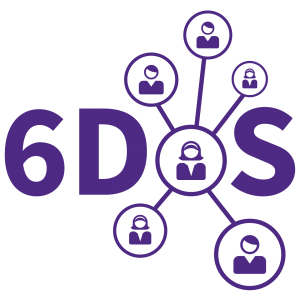 This project is funded by the NSF Grants CNS-1211375, CNS-1010904, OCI-0904356, IIS-0838564, UL 1RR024146-0652, NIH CTSA award UL 1RR025741, SUL1RR025741-04S3, BCS-0940851, and Army Research Laboratory under Cooperative Agreement Number W911NF-09-2-0053.
This project is funded by the NSF Grants CNS-1211375, CNS-1010904, OCI-0904356, IIS-0838564, UL 1RR024146-0652, NIH CTSA award UL 1RR025741, SUL1RR025741-04S3, BCS-0940851, and Army Research Laboratory under Cooperative Agreement Number W911NF-09-2-0053.
6-DoS (6 Degrees of Separation) is a 3-5 minute networking activity intended to help you experience and understand the processes by which people send messages to those with whom they are indirectly connected through their direct contacts. It provides participants experiential learning on the consequences of network awareness on information seeking and dissemination.
6-DoS has been built to be used in the form of a game. An administrator sets up the initial parameters of the session (game), such as the number of strong and weak contacts that the participants can choose. The participants choose their strong and weak contacts from within the group participating in the session. Each participant is then assigned a random “destination.” The participants are asked to send a message through one of their contacts such that it finally reaches the destination, while also forwarding any messages that they receive, such that each message reaches its own destination.
After the session, the participants are ranked based on the accuracy of their decisions in choosing the recipients of their messages from their contacts, and some key statistical measures of the participant network and the message flow are displayed. The session can be repeated with different parameters and the results compared.
Link to the software HERE. You will need to obtain a session key from the Administrator to participate in the session.
For the Administrator (who wants to run a session and needs a session key), please watch the 6-DoS admin video (below). The video tells you how to set up a session and generate a session key, which is required your participants to join your session.
6DoS Introduction:
How to participate:
How to set up:
Instruction Slides:
Game Feedback:
- UX Evaluation Survey ← If you played 6-DoS, please participate in this survey! Your feedback is invaluable to us.
- If you have any questions or feedback, contact us via email at sonic.6dos@northwestern.edu!
Principal Investigator: Noshir Contractor
Researchers Involved: Kyosuke Tanaka, Arshya Srinivas
Developer: Harshad Gado
Publications and Presentations:
Tanaka, K., DeChurch, L. A., & Contractor, N. S. (2020, September 25-27). Positional and dispositional factors that predict who commits social network routing errors and who learns from them [Conference presentation]. Virtual Organizational Communication Mini Conference (OCMC)
Tanaka, K., Jha, S., Gado, H., Twyman, M.D., DeChurch, L.A., & Contractor, N.S. (2018, June). 6-DoS (Six Degrees of Separation): A web-based platform to conduct small-world experiments. Paper presented at the XXXVIII Sunbelt Conference of the International Network for Social Network Analysis (INSNA), Utrecht, Netherlands.
Tanaka, K., DeChurch, L., & Contractor, N. (2018, May). Origins of omission and commission errors in perceptions of group communication networks. Paper to be presented at the 68th Annual ICA conference, “Voices,” Prague, Czech Republic.
Nicholson, M., Tanaka, K., Lungeanu. A., & Contractor, N. S. (2018). Creating a Framework for Evaluating the Effectiveness of Various Search Strategies in the Small-World Phenomenon. Poster presented at Northwestern University Computational Research Day, Evanston, IL, April 10.
Jha, S., Tanaka. K., DeChurch, L. A., & Contractor, N. S. (2018). Network Acuity: Social Perceptions in a Small-World Experiment. Poster presented at Northwestern University Computational Research Day, Evanston, IL, April 10.
Project RED Relay V2.0
Links:
Admin login: bit.ly/redrelayadmin2
Crew login: bit.ly/redrelaycrew2
Mission Control login: bit.ly/redrelaymc2
Project RED Relay V1.0
Link: bit.ly/6dosnasa
